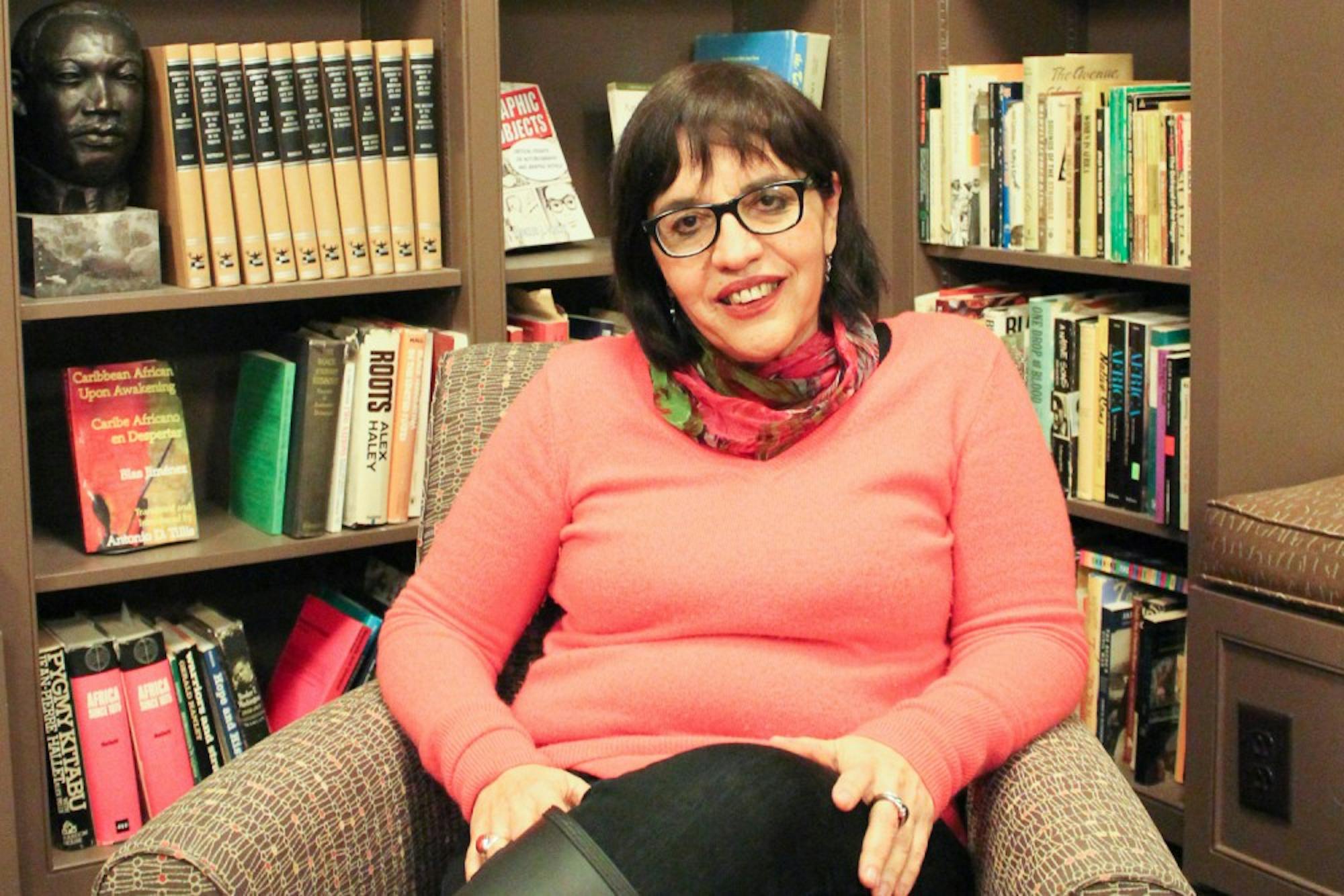Maria Salgueiro grew up surrounded by Brazil’s racial inequality. Her African-Brazilian grandfather was the son of a former slave, and her grandmother was a white Portuguese woman. As she grew up, Salgueiro felt herself become aware of how her grandfather’s dark skin tone affected the way he was treated. At times, his easygoing nature and kind words made him the life of the party. Yet in other instances, she saw him cast aside, disregarded in public settings. She saw, through her personal experiences, that the idea of racial democracy — that people of all races and skin tones are treated equally in Brazil — was, and remains, a myth.
Salgueiro, a visiting African and African-American studies professor, proudly calls herself a Brazilian activist. She is currently spending her fourth winter at Dartmouth, teaching a 10-person seminar about race, class, gender and sexuality in modern Brazilian films. Salgueiro spends the rest of the year as a professor at the Federal University of Rio de Janeiro, where she met AAAS chair Antonio Tillis in 2004, sparking an academic relationship that brings her back to Dartmouth every year.
The topics of her classes align well with her passions for activism. Salgueiro focuses on gender and race, and she hopes to better connect the University of Rio de Janeiro with the region’s external community.
Rio de Janeiro is surrounded by favelas, or hilltop shanty towns, where Salgueiro’s interest in activism began. As a teenager, she taught older favela residents how to read and write and witnessed the effects of poverty and the importance of reaching out to those in need.
Salgueiro said there exists a “myth of racial democracy” in Brazil, which inaccurately declares that everyone gets along and racism does not exist. Historically, Brazil is known for less racism and segregation than other post-colonial countries, including the U.S., she said.
However, Salgueiro said she believes that in reality, most of Brazil’s black population finds itself among the lower class. Following an oppressive 21-year dictatorship, which lasted until 1985 and made effective racial activism difficult, a reenergized black movement sought to illuminate prejudice in Brazil instead of sweeping the issue under the rug.
Salgueiro actively supports the movement, publicizing its efforts — like one project called “Black Notebooks,” which publishes poems and short stories by black authors twice a year — to Brazilian students at the university.
Much of Salgueiro’s current activism stems from her teaching. Coming from a family of teachers, she said education was a natural extension of her home environment.
She said teaching offers her the “possibility of exchanging ideas, the possibility of seeing people grow all the time and the possibility of seeing people start asking different questions.”
As a professor, Salgueiro connects her Brazilian students with the Rio de Janeiro community by promoting work outside the classroom through activities like community poetry readings.
“It’s not just teaching a course — it’s something broader,” Salgueiro said. “When you’re teaching literature, when you’re working with the kind of programs as I do, there is a lot of interface with society.”
During her time at Dartmouth, Salgueiro rotates between two classes: her current film class and a literature course focused on Afro-Brazilian literature by female authors. Salgueiro said that Dartmouth’s library has resources lacking in Brazil. She then uses this knowledge to further educate her Brazilian students and improve her activism efforts.
“What you have here is, ‘Wow!’” she said. “I act as a multiplier. I can take lots of this back to my work in Brazil.”
After hearing about her work at Dartmouth, one of Salgueiro’s Brazilian Ph.D. students was inspired to submit an application for a Fulbright grant, which brings foreign students to the U.S. to pursue their talents and passions, Salgueiro said. He was selected for the program and will arrive at Dartmouth in September to begin six months of research.
Portuguese professor Carlos Minchillo, who is originally from Brazil, said he had heard of Salgueiro’s work long before meeting her at Dartmouth. Salgueiro, he said, is widely recognized for being one of the first Brazilian scholars to center her work on literature by Afro-Brazilian female writers.
“Her engagement in the issues of her work is contagious,” he said. “At the same time, she’s a very careful and sophisticated scholar.”
Ellie Peterson ’15, a film major who is currently taking Salgueiro’s course, said she chose the class because she enjoys the energy of Brazilian films and wanted more experience analyzing them.
Peterson said that Salguiero holds fierce opinions about the material and is highly informed about Brazilian film. Salgueiro also encourages students to bring in articles about current protests in Brazil to infuse the course with a modern Brazilian context, Peterson said.
“She gets really excited when we bring those things in,” Peterson said. “I know that that’s something that she’s very invested in and has been following very closely.”
Sandra Okonofua ’14, who is also in the class, said Salgueiro’s enthusiasm and passion for enacting change in Brazil shines through in every lecture. Salgueiro ties the material back to her life experiences with activism in an animated and engaging way, which makes the material ring true for students in the class, Okonofua said.
“I just think she’s a doer,” Okonofua said. “She practices what she preaches.”
Salgueiro combines high expectations with a calm nature, Okonofua said, which makes students feel comfortable in class, but also aware of her standards for active participation.
Over the past 40 years, Salgueiro said she has crafted her own definition of activism, informed by her work as a teacher and her experiences in Brazil.
“In my point of view, activism is working proactively with groups,” Salgueiro said. “Working with classes and communities so that through art — and I’m talking specifically literature and film — they can grow, and they can see what they are able to do in the environment in which they live.”




